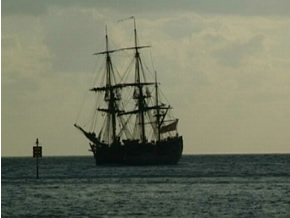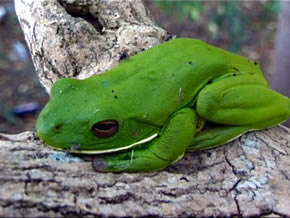
“At nightfall rocks
and shoals were seen ahead… at supper she (HMB Endeavour) went
over a bank of 7 or 8 fathom water which she came upon very suddenly:
this we concluded to be the tail of the Shoals we had seen at sunset
and therefore went to bed in perfect security, but scarce were we
warm in our beds when we were called up with the alarming news of
the ship being fast ashore upon a rock, which she in a few moments
convinced us of by beating very violently against the rocks.”
Joseph Banks, HMB Endeavour, 11 June, 1770.
 |
Imagine
standing on the deck of His Majesty’s Barque, Endeavour, listening
to the sounds of a hidden reef tearing wooden chunks from the underside
of your ship. HMS Endeavour had been on an expedition to explore
parts of the South Pacific, leaving Plymouth, England in August,
1768. Her mission, to search the southern seas for ‘Terra Australis
Incognita’-the unknown southern land. On board HMBEndeavour,
under the command of Lt. James Cook, was a crew of 72 men, 12 marines
and 11 civilians. The civilians were a team of scientists put together
by Joseph Banks. It was this team which introduced the world to
Australia’s amazing flora and fauna.
Bad weather had forced the Endeavour
northward along the east coast of Australia. Cook surveyed the coastline
as they proceeded north, naming many of the landmarks still in use
today. Due to the dangerous hidden shoals and reefs within the Great
Barrier Reef, the Endeavour seldom landed. However, in June, 1770,
the crew struck the reef mentioned in Banks’ quote and were
forced to beach the ship for repairs in the sheltered harbor at
the mouth of what Cook named the Endeavour River. “The Captn
and myself went ashore to view the Harbour and found it indeed beyond
our most sanguine (optimistic) wishes…it was the mouth of a
river…” Joseph Banks.
 |
For
the next seven weeks, while repairs were completed, the men explored
the local environment. They encountered Aborigines, which Banks
describes as “very small people, about 5 feet 6 in height…very
slender…their hair strait in some and curled in others…They
painted themselves with white and red,in lines on different parts
of their bodies…Their ornaments were few: necklaces…of
shells, bracelets…”
The crew also collected plant and
animal samples. They saw their first kangaroo, possum and other
animals unknown to Europeans. Banks writes, “In gathering plants
today I myself had the good fortune to see the beast so much talked
of; he was not only like a grey hound in size and running but had
a long tail, as long as any grey hounds; what to liken him to I
could not tell, nothing certainly that I have seen at all resembles
him.”
After
seven weeks, the repairs completed, Endeavour safely navigated the
Great Barrier Reef and continued her journey northward.
|